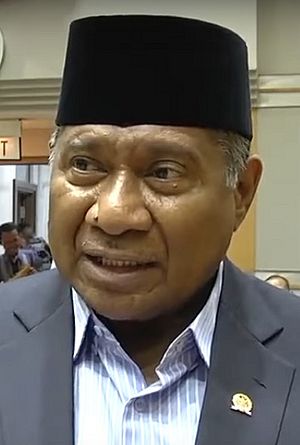Ali Taher facts for kids
Quick facts for kids
Ali Taher
|
|
|---|---|

Taher in 2019
|
|
| Member of the People's Representative Council | |
| In office 1 October 2014 – 3 January 2021 |
|
| President | Joko Widodo |
| Parliamentary group | National Mandate Party |
| Constituency | Banten III (Tangerang, Tangerang Regency, and South Tangerang) |
| In office 1 October 1997 – 1 October 1999 |
|
| President | Suharto B. J. Habibie |
| Parliamentary group | United Development Party |
| Constituency | East Nusa Tenggara |
| Personal details | |
| Born | 9 February 1961 Lamakera, East Flores, East Nusa Tenggara, Indonesia |
| Died | 3 January 2021 (aged 59) Jakarta, Indonesia |
| Cause of death | COVID-19 |
| Political party | National Mandate Party |
| Other political affiliations |
United Development Party |
| Spouse | Sri Murniati |
| Children | 5 |
| Education | Muhammadiyah University (S.H.) Tarumanagara University (M.Hum) Padjadjaran University (Dr.) |
Muhammad Ali Taher Parasong (born February 9, 1961 – died January 3, 2021) was an Indonesian politician. He was a member of the People's Representative Council, which is like the parliament or law-making body of Indonesia. He represented the Banten III area from 2014 until he passed away. He was a member of the National Mandate Party.
Contents
Early Life and Education
Ali Taher was born on February 9, 1961, in Lamakera. This was a small Muslim fishing village in the province of East Nusa Tenggara, Indonesia.
In the 1970s, Taher decided to move to Jakarta, the capital city. He traveled by cargo boat to Surabaya, then continued his journey to Jakarta. There, he stayed with relatives.
He went to an evening elementary school in Slipi and finished in 1974. He then attended Muhammadiyah Junior High School, graduating in 1977. After that, he went to State High School No. 16 in West Jakarta, finishing in 1981.
After high school, Taher studied at Muhammadiyah University. He earned a law degree (S.H.) after six years of study. Later, in 2002, he received a magister degree in humanities from Tarumanagara University. In 2012, he earned a doctorate from Padjadjaran University.
Career Journey
After finishing his university studies, Ali Taher became a lecturer at Muhammadiyah University. He also taught at other universities. These included the Muhammadiyah Economic Institute in Tangerang starting in 1993, and the YATSI Health Institute in Tangerang from 2006.
Besides teaching, Taher also worked in health management. He was the Vice General Manager of the Jakarta Islamic Hospital from 1991 to 2001. He also owned two companies, RUSLAM Cempaka Putih Jaya and Catur Darma Utama.
Political Path
Ali Taher began his political career in 1997. He was elected as a member of the People's Representative Council for the East Nusa Tenggara area. His first term ended in 1999.
After 1998, when political parties became more open, Taher joined the National Mandate Party. He held several important roles within the party:
- Deputy General Secretary from 2005 to 2010.
- Chair of the party from 2010 to 2020.
- Member of the party's advisory body from 2020 until his death.
Because of his party connections, Taher also worked as an expert staff member for the Minister of Forestry, Zulkifli Hasan. Zulkifli Hasan was also a member of the National Mandate Party.
Working in Government
Taher ran for the People's Representative Council again in 2004 and 2009. He ran for the Banten II (2004) and Banten III (2009) areas. Even though he received many votes, he did not win a seat in these elections.
In the 2014 Indonesian legislative election, Taher ran once more for the Banten III area. This time, he won! He received 62,479 votes and became a member of the People's Representative Council from 2014 to 2019. He was re-elected in the 2019 Indonesian general election with 71,495 votes.
During his time in the People's Representative Council, Taher worked on Committee VIII. This committee deals with important topics like religion, social issues, and helping women. He became the chairman of this committee on May 26, 2016.
Focus on Family Support
Ali Taher became well-known for helping to propose the Family Resilience Bill. This bill was an idea to help families stay strong and healthy. Taher believed it was important because of the number of divorces in Indonesia. He felt the bill could offer new ways to solve problems families face.
The bill aimed to support traditional family roles. It suggested that husbands would be responsible for providing for the family. Wives would be responsible for managing the household. Taher thought this bill was needed to help families be more stable.
Later Life and Passing
On December 27, 2020, Ali Taher was diagnosed with COVID-19 during the COVID-19 pandemic in Indonesia. He chose to be treated at the Jakarta Islamic Hospital. He believed many patients recovered there.
After a brief improvement in his health on January 2, his condition worsened. Ali Taher passed away on January 3, 2021, at 2:00 PM.
See also
 In Spanish: Ali Taher para niños
In Spanish: Ali Taher para niños
 | Chris Smalls |
 | Fred Hampton |
 | Ralph Abernathy |

